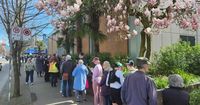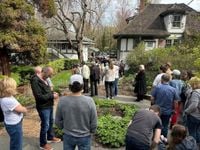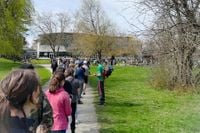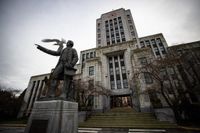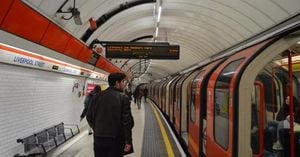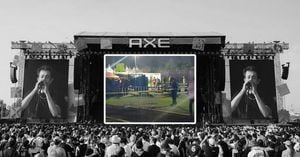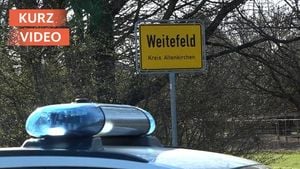Vancouver residents faced significant challenges during the municipal byelection on April 5, 2025, as many voters encountered long lineups, with waits exceeding three hours at some polling stations. This election, aimed at filling two vacant city councillor seats, has drawn considerable attention and is perceived as a referendum on the leadership of Mayor Ken Sim and his ABC party.
Polling began at 8 a.m. and was set to continue until 8 p.m. Across the city, 25 polling stations were operational, representing a nearly 50% reduction from the 50 locations available during the last civic by-election in 2017. This reduction, combined with a significant cut in staffing levels, contributed to the extensive wait times reported by voters.
Locations like Hillcrest Centre, Trout Lake Community Centre, and Britannia Community Centre saw wait times soar beyond two hours, while Kitsilano Community Centre reported waits of over three hours. "It’s a very important election," said Jay Lannon, a voter at Kitsilano, who opted to cancel her yoga class to cast her vote. "I’m not very impressed with Ken Sim’s leadership. I believe in a progressive society and don’t feel our current municipal government delivers on that."
The long lines began to form shortly after polls opened, with reports of queues wrapping around blocks at various polling sites. A polling station attendant at West Point Grey Community Centre expressed gratitude for voters' patience, acknowledging the unexpected turnout that led to an hour-long wait. This surge in participation follows record numbers during advance voting days, where 7,671 ballots were cast, marking an 84% increase compared to the advance voting period in the 2017 byelection.
Despite the high turnout, the city’s elections office had anticipated a lower participation rate, basing its operational planning on historical data from previous by-elections, which typically see lower voter engagement. The last by-elections held in Vancouver were in 2017, 1992, and 1985, with the 2017 byelection seeing a turnout of just 10.99%. In contrast, the current election has shown signs of heightened interest.
Voters have expressed frustration not only with the long wait times but also with the apparent lack of preparation by election officials. One voter at Britannia Community Centre shared, "It was a frustrating experience; they obviously didn’t have enough staff." This sentiment was echoed by Sal Robinson, a spokesperson for the TEAM For A Livable Vancouver party, who criticized the planning of the byelection, stating, "This poor planning for voting stations is demonstrably discouraging people from exercising their democratic right to vote."
In response to the long lines, the city mobilized an additional 45 staff members to assist with the voting process and deployed extra vote tabulators to the busiest locations. The elections office also noted that a priority access line was available for voters with diverse access needs, including seniors, pregnant individuals, and those with disabilities.
City officials attributed the long queues to the unprecedented voter turnout, with a spokesperson stating, "The City of Vancouver’s Elections Office appreciates Vancouverites’ commitment to participating in the byelection and the patience they are demonstrating when voting." However, many voters reported that the reduced number of polling stations and staff made the process unnecessarily difficult.
The city's elections office had initially budgeted $2 million for the byelection, which included funds for staffing, voting places, and equipment. This budget reflects an increase from the $1.2 million spent on the 2017 byelection, although the number of workers was cut from 631 to 265. Critics of the staffing decisions, including some city councillors, have questioned the wisdom of such reductions, especially given the high level of interest in the current election.
Vancouver’s municipal byelection is particularly significant as it follows the departure of two councillors—Adriane Carr of the Green Party and Christine Boyle of OneCity—both of whom left their positions to pursue roles in provincial politics. Their exit has left only two non-ABC councillors on the council, heightening the stakes for the candidates vying for the vacant seats.
The ABC party is fielding candidates Ralph Kaisers and another individual, while TEAM is represented by former councillor Colleen Hardwick. Other left-of-centre parties, including COPE and OneCity, have also put forward candidates, signaling a competitive race.
As the day progressed, the city’s elections office continued to monitor the situation, encouraging voters to utilize the priority access line and curbside voting options. Despite the logistical challenges, many voters expressed excitement about the high turnout, viewing it as a positive sign for civic engagement.
Kate Bird, a 71-year-old voter, shared her experience waiting two hours at Hillcrest Community Centre, noting, "I’m really thrilled to see so many people, and lots of young people and lots of people standing there with kids, you know, getting out for a byelection. It’s great."
As the polls closed at 8 p.m., the city prepared to begin counting the votes, with officials hopeful that the increased turnout would translate into a more engaged electorate moving forward. The results of this byelection are anticipated to reflect not only the preferences of Vancouver voters but also their sentiments toward the current administration and its policies.
This byelection marks a pivotal moment for Vancouver’s political landscape, and all eyes will be on the results as they unfold, potentially shaping the future direction of the city council.
